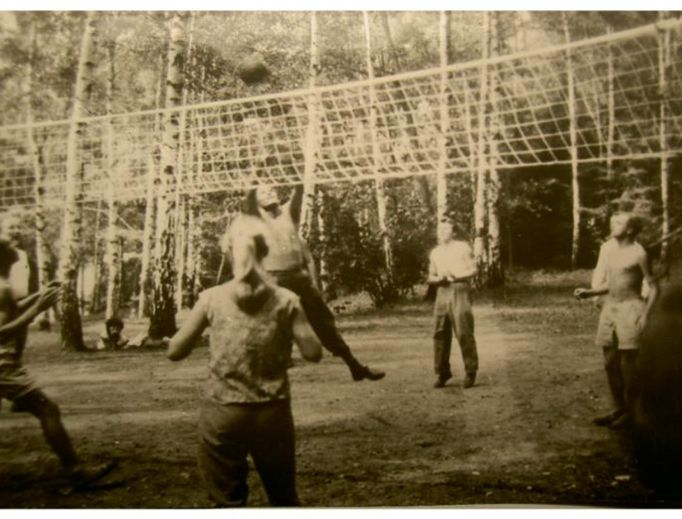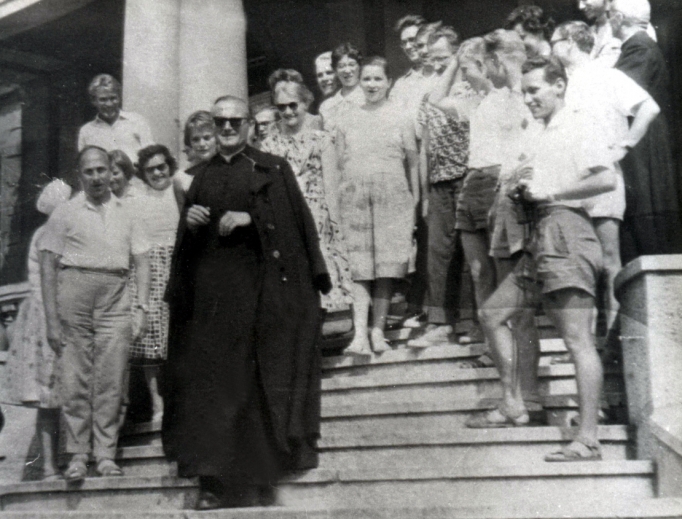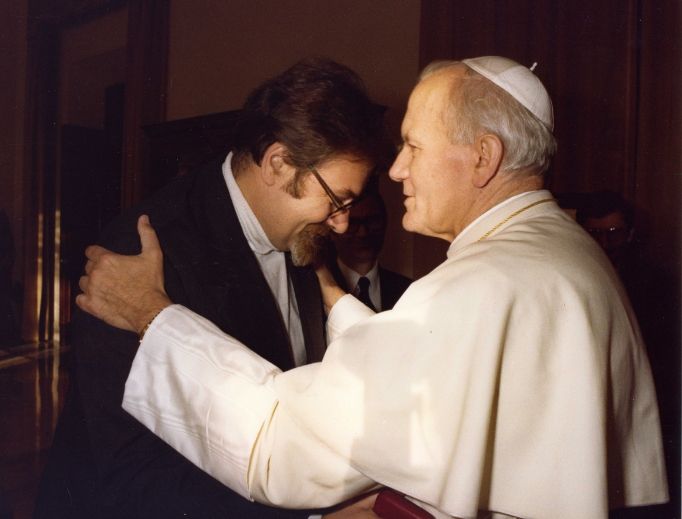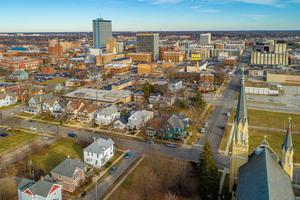Celebrating John Paul II’s 100th Birthday
A longtime friend reflects on the saint’s impact.

May 18, 2020, is the 100th birthday of St. John Paul II. The first Polish pope was born in 1920, just two years after his country regained its independence after 123 years of foreign occupation. He came into adulthood just as Nazi Germany and Soviet Russia invaded his country in 1939. The beginning of the occupation of his country would not end until 1989, after Karol Wojtyła had already been Pope 11 years.
Many reflections on John Paul’s centennial will examine his enormous impact on the Church and on the world. This will take a more personal look, from the perspective of my friends for the past 31 years, Jerzy and Maria Gałkowski.
Jerzy is professor emeritus of ethics at the John Paul II Catholic University of Lublin (KUL) in Poland. His wife, Maria, is professor emeritus of psychology there. Karol Wojtyła taught philosophy at KUL, the only free and independent university that existed anywhere behind the Iron Curtain. He was also Gałkowski’s teacher and mentor. Jerzy and Maria, with whom I’ve talked these past three decades about the Polish pope, gave me this interview at Easter.
I met the Gałkowskis in Rome in the summer of 1989. I was there to attend the summer school that KUL ran at the Polish Pilgrimage Home; they were in Rome to mark their 25th wedding anniversary. We both were to meet with Pope John Paul II that June 29, the Solemnity of Sts. Peter and Paul.
The rector of the school asked me, “Do you know Jerzy Gałkowski?” I thought he was asking me a theoretical question, so I answered, “Yes, I read his book on work. I think the guy is right on target.” From behind me came the voice, unbeknownst to me, of Galkowski: “Thank you.” We’ve been friends ever since.
Gałkowski first met Father Wojtyła when he began his university studies in philosophy in 1956. He attended his lectures. Father Wojtyła was the mentor of Gałkowski’s doctoral dissertation. In Poland, no one can hold the title “professor” unless they earned a “habilitation,” i.e., essentially produced a second doctoral dissertation without any mentorship. Habilitations must be reviewed by a full professor who was already a recognized specialist in that field. Although he was already pope, John Paul II was the reviewer of Gałkowski’s habilitation in 1979.
Gałkowski says Wojtyła was “an extraordinarily popular lecturer. He filled classrooms. His lectures were not purely theoretical but connected to real life.” Gałkowski recalls how the future pope led lively discussions on the classical works of philosophy, from which he would select a key point and delve into it deeply.
Later, after becoming archbishop, Wojtyła could not regularly travel to Lublin, so … his students went to Kraków. The archbishop’s schedule demanded a compressed teaching schedule, so seminars sometimes lasted the whole day. Gałkowski recalls Wojtyła taking his seminar students on daylong trips into the Polish mountains to debate the perennial problems of philosophy. Nor did he limit his “teaching” to sitting on a stump in the countryside. Gałkowski also recalls how Wojtyła took his students with him on vacation, on mountain hikes and kayak trips, where work and fun mixed.



Gałkowski remembers him for his pastoral presence. What most impressed him was Wojtyła’s “simple manner of being, his poverty and his thorough prayerfulness.” He admired his courage, exemplified at Nowa Huta, where, as archbishop, he opposed the communist civil authorities, who forbade a parish church in the “model workers’ city” they were building next to Kraków. He defied them by celebrating Christmas midnight Mass outdoors, in public, when the civil authorities forbade it.
Gałkowski most appreciates Wojtyła’s “new vision of philosophy. He knew how to bring traditional and contemporary thinking together. In this effort, above all, was a sensitivity to the person and to social questions.” But while he was ready to challenge any ideology that diminished the value of the person, Wojtyła’s “polemic was always about something — some issue, question or way of doing things — but never somebody. It was never personal.”
In contrast to many of his colleagues in the philosophy faculty, Gałkowski was a layman. But he insists that Wojtyła was not clericalist. “He always had good contacts with laypeople,” he says.
“He never made distinctions among his students, most of whom were laypeople joined all together by close ties.”
That joining included Gałkowski. He was already Wojtyła’s “assistant,” i.e., the junior faculty member responsible for Wojtyła’s chair of ethics, when Gałkowski planned to marry in 1964. Jerzy and Maria both attended Archbishop Wojtyła’s lectures, and “we couldn’t imagine anybody else marrying us.” But, given Wojtyła’s busy schedule — archbishop, professor, pastor, participant in Vatican II — when could he fit the wedding in?
“Our wedding took place on an early Monday morning, July 6, 1964, in a little church between Warsaw and Kraków, in a little village where my in-laws lived,” Gałkowski says. “They had hidden there during the German occupation. Wojtyła married us and stayed until the afternoon. Later, on our 25th anniversary, he invited us to the Vatican.”
Fifteen years after St. John Paul’s death, what does Gałkowski think will be the lasting impact of Wojtyła’s life and thought? Gałkowski admits that, “from the point of view of a philosopher, Karol Wojtyła’s election as pope was a certain loss.” Philosophy lost a creative thinker whose energies were already — as archbishop — being consumed by the Church. “But the Church and the world profited from it because, on account of his broad and deep knowledge, his personal values, his artistic creativity and his ability to make contact with people — in short, thanks to the love of neighbor he demonstrated — he became a prophet for all peoples.”
He especially singles out Wojtyła’s “personalistic humanism,” emphasizing both the “equality of all men … all have the same dignity,” and that “every person is unique.” That meant every person was a rational and free being who could choose his own path, guided responsibly by conscience and an objective knowledge of moral laws and values. Wojtyła taught a world that was not forging one’s own path, faithful to the moral law and conscience, that this was not just something theoretical; it was a real way of living and being. One way that way of living endured was in the lives of Jerzy and Maria Gałkowski.
John M. Grondelski, Ph.D., writes from Falls Church, Virginia.
















